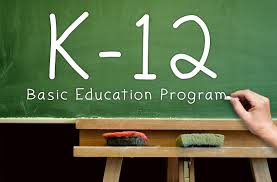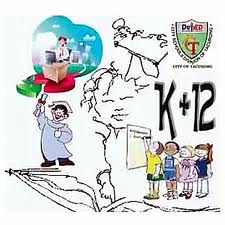Sponsored Links
The K -12 Education System: Benefits for the Filipinos
 Last school year 2012-2013, the educational system of the Philippines was enhanced from the 10-years basic education into 12-years through the program called the K-12 Education Plan of the Department of Education.
Last school year 2012-2013, the educational system of the Philippines was enhanced from the 10-years basic education into 12-years through the program called the K-12 Education Plan of the Department of Education.
Accordingly, the implementation of the K-12 education plan in the Philippine Basic Education Curriculum is the key to our nation’s development. The government may be facing many problems in the implementation of the program yet it is important that we implement it because the enhancement of the quality of education is very urgent and critical.
It is not difficult to understand why, despite the additional costs the program would entail, the public generally appears to take the President’s K -12 basic education program sitting down. In 2010, Mr. Isagani Cruz wrote in one of his columns in a local newspaper some good reasons not to disagree with K-12 education plan in the Philippines.
First, he mentioned decongestion of subject skills and competencies. The students will be able to get sufficient instructional time to do subject-related tasks, which makes them more prepared and well-trained on that subject area. In the old system, Filipino students have been getting low achievement scores and international tests results revealed that we often come at the tail end in the exams as compared to other countries. An enhanced curriculum will decongest academic workload, giving students more time to master competencies and time for extra –curricular activities, thus, allowing for their more holistic development.
Another good reason why we should support the K -12 is that graduate of this program will be more prepared to enter the labor force. The majority who graduate high school and do not go to college are too young to enter the labor force, thus they would either be unemployed or be vulnerable to exploitative labor practices. Those who would be interested to set up businesses cannot legally enter into contracts. With the new curriculum, senior high school students can choose a field that they are good at and that they are interested in.

As a result, they will be equipped with the skills needed for a specific job even without a college degree. At the age of 18, the age when they graduate from high school, they will be employable and competitive already. Graduates will be able to earn higher wages and /or better prepared to start their own business. Studies in the Philippines have shown that additional year of schooling increases earnings by 7.5%. K -12 will be able to contribute to economic growth.
Finally, Filipino graduates will be automatically recognized as professionals abroad because we are following the international education standard as practiced by all nations. The Philippines is the last country in Asia and one of the only three countries (Djibouti and Angola in Africa are the other two countries) with a ten (10) year pre-university program. With the K – 12, there will be no need to study again and spend more money in order to qualify to their standards.
With this, Filipino professionals who aspire to work abroad will not find a hard time in getting jobs in line with their chosen field and will be able to help their families more in the Philippines as well as the country’s economy with remittances, property buying and creation of businesses. Several studies have shown that the improvements in the quality of education will increase GDP growth by as much as 2%. A better educated society provides a sound foundation for long term socio-economic development.
Filipinos are known to be competitive in the international community. While this may be true, the old basic education system hindered us in becoming more competitive among other countries. The K-12 education plan offers a great solution to that problem. However, not all believe that the program can solve the existing problems in the basic educational system such as shortages in rooms, educational materials and other facilities and equipment, underfunding, the orientation of the educational system and access. They also pointed out that the major flaw of the K-12 is that it is anchored on improving the competencies of in-school youth without addressing the problem of the growing number of out-of-school youths in the country who equally deserves to be in school.
But, if we focus on the long term effect of K-12, we can conclude that it is still very beneficial to us Filipinos. Therefore, we must have the strong will in supporting the K-12 Educational Plan for the betterment of our educational system and economic development. Remember, if we want change in our society, we must start it with our education system.
About the Author:
RODIL T. NAVARRO is currently a teacher of San Joaquin-Kalawaan High School and is pursuing his Masteral Degree in Educational Management at Rizal Technological University. The discussion is based on the ORAL REPORT assigned to him by his professor, Prof. Jensen Manebog, in the subject Advanced Curriculum Development.





Comments
melchor j. mission
Fri, 02/21/2014 - 04:13
Permalink
production and operation management